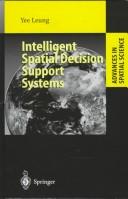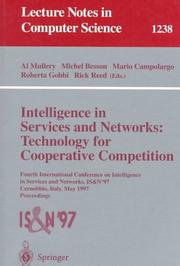| Listing 1 - 2 of 2 |
Sort by
|

ISBN: 3540625186 3642645216 3642607144 Year: 1997 Publisher: Berlin Springer
Abstract | Keywords | Export | Availability | Bookmark
 Loading...
Loading...Choose an application
- Reference Manager
- EndNote
- RefWorks (Direct export to RefWorks)
In the past half century, we have experienced two major waves of methodological development in the study of human behavior in space and time. The fIrst wave was the well known "quantitative revolution" which propelled geography from a mainly descriptive discipline to a scientifIc discipline using formalism such as probability, statistics, and a large-number of mathematical methods for analyzing spatial structures and processes under certainty and uncertainty. The second wave is the recent advancement of geographical information systems which equips geographers with automation in the storage, retrieval, analysis, and display of data. Both developments have significant impacts on geographical studies in general and solutions to real life spatio-temporal problems in particular. They have found applications in urban and regional planning, automated mapping and facilities management, transportation planning and management, as well as environmental planning and management, to name but a few examples. Both developments have one thing in common. They one way or the other use computer to process and analyze data. However, not until recently, there has been very little interaction between the two. Quantitative models have largely been developed independent of the underlying data models and structures representing the spatial phenomena or processes under study. Display of analysis results has been primitive in terms of the utilization of computer graphic technologies. Formal models, in addition to their technical difficulties, have poor capability in communication with users. Geographical information systems, on the other hand, have originally been developed with a slight intention to entertain powerful analytical models.
Geographic information systems. --- Geografie --- Geografische Informatie Systemen --- Modelleren. --- Regional economics. --- Spatial economics. --- Geographical information systems. --- Computers. --- Operations research. --- Decision making. --- Regional/Spatial Science. --- Geographical Information Systems/Cartography. --- Information Systems and Communication Service. --- Operations Research/Decision Theory. --- Deciding --- Decision (Psychology) --- Decision analysis --- Decision processes --- Making decisions --- Management --- Management decisions --- Choice (Psychology) --- Problem solving --- Operational analysis --- Operational research --- Industrial engineering --- Management science --- Research --- System theory --- Automatic computers --- Automatic data processors --- Computer hardware --- Computing machines (Computers) --- Electronic brains --- Electronic calculating-machines --- Electronic computers --- Hardware, Computer --- Computer systems --- Cybernetics --- Machine theory --- Calculators --- Cyberspace --- Geographical information systems --- GIS (Information systems) --- Information storage and retrieval systems --- Spatial economics --- Economics --- Regional economics --- Regional planning --- Regionalism --- Space in economics --- Decision making --- Geography --- Geographic information systems --- History. --- Statistical methods.

ISBN: 3540631356 3540691553 Year: 1997 Volume: 1238 Publisher: Berlin [etc.] : Springer-Verlag,
Abstract | Keywords | Export | Availability | Bookmark
 Loading...
Loading...Choose an application
- Reference Manager
- EndNote
- RefWorks (Direct export to RefWorks)
Intelligence in Services and Networks focuses on exploring how best the inherent intelligence in networks may be employed and enhanced to provide, firstly, flexibility and open competition in the provision of communications-based services and, secondly, the means for managing and administering end-to-end communication systems that span many independent network operators and service providers. The emphasis in this area of research is on applying the best techniques for system specification and corresponding software development, as a basis for the creation of open platforms, and subsequent standardisation. Resolving this issue is key to the successful deployment of advanced communications in the deregulated and highly competitive environment that will underpin any futher "information society".
Telecommunication systems --- Broadband communication systems --- Integrated services digital networks --- Computer networks --- Telecommunications --- Electrical & Computer Engineering --- Engineering & Applied Sciences --- Congresses --- Design and construction --- Communication systems --- Communications systems --- Systems, Communication --- Computer science. --- Computer communication systems. --- Software engineering. --- Computers. --- Management information systems. --- Electrical engineering. --- Computer Science. --- Computer Communication Networks. --- Software Engineering. --- Communications Engineering, Networks. --- Information Systems and Communication Service. --- Management of Computing and Information Systems. --- Telecommunication. --- Information systems. --- Information Systems. --- Electric communication --- Mass communication --- Telecom --- Telecommunication industry --- Communication --- Information theory --- Telecommuting --- Computer software engineering --- Engineering --- Informatics --- Science --- Computer-based information systems --- EIS (Information systems) --- Executive information systems --- MIS (Information systems) --- Sociotechnical systems --- Information resources management --- Management --- Automatic computers --- Automatic data processors --- Computer hardware --- Computing machines (Computers) --- Electronic brains --- Electronic calculating-machines --- Electronic computers --- Hardware, Computer --- Computer systems --- Cybernetics --- Machine theory --- Calculators --- Cyberspace --- Electric engineering --- Communication systems, Computer --- Computer communication systems --- Data networks, Computer --- ECNs (Electronic communication networks) --- Electronic communication networks --- Networks, Computer --- Teleprocessing networks --- Data transmission systems --- Digital communications --- Electronic systems --- Information networks --- Telecommunication --- Cyberinfrastructure --- Electronic data processing --- Network computers --- Distributed processing
| Listing 1 - 2 of 2 |
Sort by
|

 Search
Search Feedback
Feedback About UniCat
About UniCat  Help
Help News
News